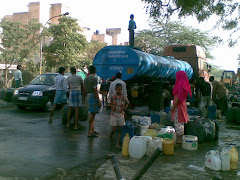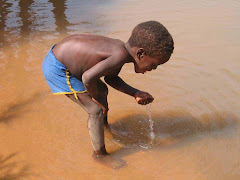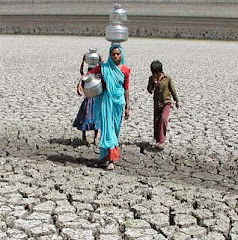Several of the world's largest corporations, some with operations spanning several countries, have been urged to disclose their complete water usage and participate in the first voluntary water-disclosure exercise being undertaken at a global scale by London-based investor-backed non-profit organization Carbon Disclosure Project (CDP).
The CDP issued the first of its kind water-disclosure questionnaire last week in London and began a campaign that seeks to put water consumption on par with carbon emissions as a concern of company shareholders. The organization had scheduled for release of the questionnaire around this time when it launched the initiaitve around November last year.
The exercise is purely voluntary and those who have been approached may not respond. But, they are being encouraged by a pool of investors that brings with it formidable wealth, to do so. The investors represent some $16000 billion worth of assets between themselves.
The initiative comes against a backdrop of declining global water availability creating an immense challenge for companies, and a demand for increasing accountability on usage of the fast depleting resource. In fact, several reports have highlighted that poor water availability as well as an increase in its procurement cost is emerging a formidable business risk.
Several projections point out that in several areas across the world, water may not just be available to run business operations in the not so distant future. At the same time, experts have been issuing stern warnings that companies, and their investors, should start to appreciate the new category of risk to their future businesses -- running out of water.
Projects like CDP's not only manage to create awareness and help businesses and institutional investors understand the risks and opportunities associated with water scarcity and other water-related issues, but at the same time, give a unstated warning to most companies operating in water-intensive sectors.
The 302 companies asked to send in their responses by July-end include the who's who of the global business world -- ABB, Nokia, Intel, Procter & Gamble, Bayer, Boeing, Cadbury, Carrefour, Christian Dior, Danone, IBM, Johnson & Johnson, Coca-Cola, Nestle, Unilever, PepsiCo, McDonald's, Nike, Novartis, Sony Corporation, Yum Brands, among others.
Ford, PepsiCo, Molson Coors, L’Oréal and Reed Elsevier, some of whom are involved in the project in various capacities, are among those who have already accepted to respond.
Indian companies that have been sent the questionnaire are Bharat Heavy Electricals LTD (BHEL), Indian Oil, ITC, Larsen & Toubro, NTPC, ONGC, Reliance Industries, Steel Authority of India Ltd (SAIL). There is also Arcelor Mittal, the global steel giant of India-born LN Mittal.
The questionnaire asks the respondents to spell out if they have a water policy, strategy or management plan. And, if they have one, then it asks comanies to describe it.
It also asks respondents to identify the percentage of their operations in the world’s water-stressed areas and what portion of their water use comes from these regions. It asks companies to spell out their water use, recycling and discharges into or near wildlife habitats as well as list water-related risks and opportunities.
Basically, companies are being asked for details of their water footprint and also make a disclosure that they are maintaining stewardship on this count.
Companies that choose to respond to the questions have the option of making their answers available only to these investors, or to the larger public as well. Also, companies that have not been sent the questionnaire can also respond to it, if they want.
As human population growth and climate change exacerbate water shortages worldwide, such efforts will go a long way to ensure that water management remains tight, and companies and people remain accountable for their water usage.
Showing posts with label water management. Show all posts
Showing posts with label water management. Show all posts
Friday, April 23, 2010
Monday, January 25, 2010
Pentair eyes home water management market in India, plans new unit
The $3.5-billion US-based Pentair Group has identified India as its biggest emerging market globally. The company is keen to make its mark in the fast growing home water management and water purification segments in India.
Like several other leading companies in the sector, Pentair also sees a slew of opportunities from source-to-sink in the water management category in the country.
The company's wholly-owned Indian subsidiary Pentair Water India has decided to set up a pump manufacturing unit in the country and is finalising a location for the same. It already has a sizeable presence in India, having made its entry in 1998.
So far, it has been active in the industrial water treatment segment in the country and had been supplying membranes to almost all water purifying companies in India. The company has been providing water treatment solutions for a range of industrial, commercial and institutional applications.
The company's existing manufacturing facility at Goa is also being used to export water treatment systems to West Asia markets. Now, it has decided to set up a new pump manufacturing unit at an estimated investment of Rs 20 crore. But, as of now, the company has not decided on the location for the manufacturing facility.
The company is looking at Pune, Coimbatore and Gujarat for the plant.
Pentair is ramping up its presence in India when the water and wastewater management industry has emerged as one of the most recession proof segments poised for growth over the next several years. Companies like Pentair also stand to benefit with several state governments stepping up investments in projects related to water infrastructure.
Like several other leading companies in the sector, Pentair also sees a slew of opportunities from source-to-sink in the water management category in the country.
The company's wholly-owned Indian subsidiary Pentair Water India has decided to set up a pump manufacturing unit in the country and is finalising a location for the same. It already has a sizeable presence in India, having made its entry in 1998.
So far, it has been active in the industrial water treatment segment in the country and had been supplying membranes to almost all water purifying companies in India. The company has been providing water treatment solutions for a range of industrial, commercial and institutional applications.
The company's existing manufacturing facility at Goa is also being used to export water treatment systems to West Asia markets. Now, it has decided to set up a new pump manufacturing unit at an estimated investment of Rs 20 crore. But, as of now, the company has not decided on the location for the manufacturing facility.
The company is looking at Pune, Coimbatore and Gujarat for the plant.
Pentair is ramping up its presence in India when the water and wastewater management industry has emerged as one of the most recession proof segments poised for growth over the next several years. Companies like Pentair also stand to benefit with several state governments stepping up investments in projects related to water infrastructure.
Thursday, December 17, 2009
Water left out of COP15
The ongoing 15th annual United Nations Climate Change Conference (COP15) in Copenhagen, Denmark, is a failure for more reasons than one. Not only has the West and the others failed to arrive at a consensus so far, it has also left a crucial element out of the deliberations.
There has been no relevant mention of water on the agenda and this has caused the greens and experts to slam negotiators for their failure to recognize water as a crucial element while hammering out agreements on climate change.
Perhaps, the participants have managed to take out the single most important element to mitigating and adapting to climate change. It's what some are saying is like not talking about food shortage in the face of a famine.
It's unreasonable, no doubt. Climate change has already had demonstrable affect on global water supplies and in the future, more water stress is being predicted.
In fact, the 'UN World Water Development Report 3: Water in a Changing World', which was produced in anticipation of discussions at COP15, states that evidence of the impact of climate change on the earth’s hydrological cycle is mounting in many regions of the world, in the form of increased frequency of floods, droughts and other water hazards and changes in long-term trends in precipitation.
The report states that climate change is one of the basic drivers of change for water, besides demographic, economic, social and technological forces. "Climate change can affect water resources directly, but also indirectly through its impact on the other drivers", it adds.
Yet, COP15 managed to make just some customary do-good noise and effort about water. The conference organizers just managed to ensure that the meeting remains strictly a green one and the relevance of water was brought through serving only tap water instead of mineral water.
Delegates have also been told to bring their own cups, or use biodegradable cornstarch cups available on site. Plastic bottles will be a strict no. "If some people insist on drinking bottled water, we won't take it away from them. But we will really recommend them not to," Head of Sustainability for COP15 Jan-Christoph Napierski was quoted as saying in news reports.
But, critics feel, all this is mere posturing.
According to the Global Water Partnership (GWP) and the Global Public Policy Network on water management (GPPN), a joint initiative by Stakeholder Forum and the Stockholm International Water Institute (SIWI), water is the primary medium through which climate change impacts will be felt by human populations and the environment. Adapting to climate change will require adapting to changes in water availability and distribution.
The failure to recognise the role of water management in adapting to climate change has numerous and multifaceted repercussions for people's lives; It means that national water suppliers will not have access to sanitation systems that are resilient to flooding or unexpected weather events: It means that farmers will not have adequate information or resources to ensure that they can cope with diminishing rainfall: It means that new pressures will be put on already strained relations between neighbouring states who depend on shared water resources, a statement issued by GWP-GPPN stated.
For years to come, water would remain central to the world’s development challenges. And, lack of water, which will surely get exacerbated by climatic changes, is likely to hit future development milestones. Notwitstanding the mitigation efforts being carried out across the world, people will continue to experience the impacts of climate change through water.
It's time water gets its due in all talks on climate change.
There has been no relevant mention of water on the agenda and this has caused the greens and experts to slam negotiators for their failure to recognize water as a crucial element while hammering out agreements on climate change.
Perhaps, the participants have managed to take out the single most important element to mitigating and adapting to climate change. It's what some are saying is like not talking about food shortage in the face of a famine.
It's unreasonable, no doubt. Climate change has already had demonstrable affect on global water supplies and in the future, more water stress is being predicted.
In fact, the 'UN World Water Development Report 3: Water in a Changing World', which was produced in anticipation of discussions at COP15, states that evidence of the impact of climate change on the earth’s hydrological cycle is mounting in many regions of the world, in the form of increased frequency of floods, droughts and other water hazards and changes in long-term trends in precipitation.
The report states that climate change is one of the basic drivers of change for water, besides demographic, economic, social and technological forces. "Climate change can affect water resources directly, but also indirectly through its impact on the other drivers", it adds.
Yet, COP15 managed to make just some customary do-good noise and effort about water. The conference organizers just managed to ensure that the meeting remains strictly a green one and the relevance of water was brought through serving only tap water instead of mineral water.
Delegates have also been told to bring their own cups, or use biodegradable cornstarch cups available on site. Plastic bottles will be a strict no. "If some people insist on drinking bottled water, we won't take it away from them. But we will really recommend them not to," Head of Sustainability for COP15 Jan-Christoph Napierski was quoted as saying in news reports.
But, critics feel, all this is mere posturing.
According to the Global Water Partnership (GWP) and the Global Public Policy Network on water management (GPPN), a joint initiative by Stakeholder Forum and the Stockholm International Water Institute (SIWI), water is the primary medium through which climate change impacts will be felt by human populations and the environment. Adapting to climate change will require adapting to changes in water availability and distribution.
The failure to recognise the role of water management in adapting to climate change has numerous and multifaceted repercussions for people's lives; It means that national water suppliers will not have access to sanitation systems that are resilient to flooding or unexpected weather events: It means that farmers will not have adequate information or resources to ensure that they can cope with diminishing rainfall: It means that new pressures will be put on already strained relations between neighbouring states who depend on shared water resources, a statement issued by GWP-GPPN stated.
For years to come, water would remain central to the world’s development challenges. And, lack of water, which will surely get exacerbated by climatic changes, is likely to hit future development milestones. Notwitstanding the mitigation efforts being carried out across the world, people will continue to experience the impacts of climate change through water.
It's time water gets its due in all talks on climate change.
Subscribe to:
Posts (Atom)

.jpg)


